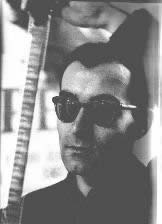
|
Filmmakers
|
 |
|
|
 JEAN-LUC
GODARD
JEAN-LUC
GODARDGodard’s first feature film, Breathless (1960) was immensely popular and quickly became a sort of “manifesto” for the New Wave. Godard is the most independent and iconoclastic of French filmmakers, the one who has best resisted the temptation of entertainment cinema. His films are always experimental in nature, a constant search for originality which tends consistently toward abstraction and hermeticism. He offers us both an ironic reflection on society and a reflection on the representation of reality by cinema. His films require a certain level of cultural sophistication on the part of the spectator, as well as a persistent effort to understand — which does not prevent some of them from appearing inaccessible. Nonetheless, Godard exercised and continues to exercise an enormous influence on the direction contemporary cinema has taken.
Godard’s career includes around seventy films, several of which were highly successful, in addition to the many others which were not but deserve to be seen. We may count among the most successful, Breathless, My Life To Live (1962), a film about prostitution (and one of Godard’s rare commercial successes), and Scorn (1963), a biting reflection on the decadence of the film industry, as well as on the failure of a married couple. Two other films, both from 1965, are also of particular interest: Alphaville, a pastiche of the police film which turns into science fiction, and Pierrot le fou, a kind of reinvention of the film noir that is considered by some to be one of Godard’s best films.
Beginning with Masculin-Féminin (1966), Godard took a turn toward “revolutionary” cinema, attacking both the consumer society and American policy in Vietnam. With Two or Three Things I Know About Her (1966), he returned to the question of women, as well as to the theme of prostitution. He went back to politics in 1967 with La Chinoise, in which a group of bourgeois students dream naïvely about a Maoïst revolution, and Weekend, an anti-bourgeois and revolutionary tirade in which he features a huge traffic jam at the origin of a series of deadly wrecks. The political current continued with Everything’s Fine (1972), the story of a strike, with sequestering of the managers, combined with the failure of a couple. It is a particularly nihilistic film. At the end of the decade Godard once again returned to the theme of prostitution, enriched with an analysis of human sexuality, in Every Man For Himself (1979), a film which enjoyed more popular success than most of Godard’s films.
In the eighties Godard’s films moved further and further away from conventional narrative schemes, tending toward an abstract formalism which is difficult for many spectators to appreciate. However, his 1982 film First Name: Carmen, an adaptation of Prosper de Mérimée’s 1845 novella (or perhaps of Bizet’s 1875 opera) returned to a more traditional narrative form and attracted a larger public as well as critical acclaim. The film was awarded the Golden Lion at the Venice Film Festival. The following year Godard provoked a scandal, with the commercial success that typically implies, with Hail Mary (1983), a modernized version of the story of the Immaculate Conception of the Virgin Mary. In 1984, where we will finish this overview, Godard made Detective, a complicated thriller that he managed to make virtually incomprehensible through convoluted editing — although the film is not devoid of interest for the spectators who persevere…
Selected Filmography (feature films)
1959 Breathless
1960 The Little Soldier
1961 A Woman is a Woman
1962 My Life To Live
1963 The Soldiers, Contempt
1964 Band of Outsiders, A Married Woman
1965 Alphaville,
1966 Masculin-Féminin, Made in U.S.A., Two Or Three Things I Know About Her 1967 La Chinoise, Weekend
1968 Joyful Wisdom, One plus One
1972 Everything’s Fine
1979 Every Man For Himself
1981 Passion
1982 First Name: Carmen (Golden Lion at the Venice Film Festival 1983)
1983 Hail Mary
1984 Détective
1986 Grandeur et décadence d’un petit commerce de cinéma
1987 Keep Up Your Right (Louis Delluc Prize 1987), King Lear
1990 New Wave
1993 Oh, Woe is me
1996 For Ever Mozart
2001 In Praise of Love